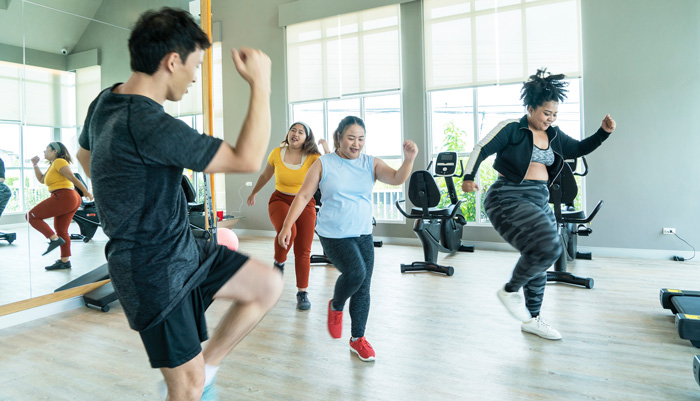Nearly three-quarters (about 74%) of adults in the U.S. are considered overweight or obese, according to the Centers for Disease Control and Prevention (CDC), but folks with larger bodies often face an uphill battle when it comes to feeling welcome and encouraged in fitness facilities. That’s where the Size Inclusive Training Academy (SITA) comes in.
With a goal of “creating equality for larger bodied people in wellness spaces, by changing the fitness industry one professional at a time,” SITA aims to “bring awareness to weight bias in wellness spaces and to educate wellness professionals on how they can operate a more inclusive practice.”
The organization’s website states, “Not only are larger-bodied people underrepresented in the fitness industry, but when they are shown it is often done in a way that shames them and/or calls their bodies something that needs to be changed or fixed. This current paradigm … actually deters larger people from engaging in fitness in a healthy and sustainable manner.”
The Size Inclusive Training Academy aims to change this with its certification for Size Inclusive Fitness Specialists. The American Council on Exercise (ACE) has partnered with SITA to bring this education to more fitness professionals. “ACE is proud to partner with the Size Inclusive Training Academy to better serve individuals who have larger bodies,” said Cedric X. Bryant, ACE president and chief science officer in a 2022 press release announcing the partnership. “Ensuring that exercise professionals apply a weight-neutral mentality in working with this population creates a more welcoming environment for the client and a more inclusive space in the fitness industry. This provides equal access to a healthier lifestyle and more opportunities to incorporate movement into people’s daily lives regardless of individual differences.”
“When it comes to physical activity and exercise, the larger-bodied demographic has different needs; fitness is not a one-size-fits-all,” said Louise Green, founder and CEO of SITA, and author of the Size Inclusive Fitness Specialist Program. “Most courses that have a focus on working with larger bodied individuals are either weight management or weight loss focused. This specialist program approaches the situation from a weight neutral position to help foster sustainable health outcomes.”
The training looks at negative outcomes of weight bias and the experiences of larger-bodied individuals and their often-fraught relationship with exercise.
“The Size Inclusive Fitness Specialist Program provides evidence–based methods on how to repair larger bodied individuals’ relationship with exercise. It includes a deep examination of the psychological, physiological—and often physical—barriers this demographic often faces in the fitness space.”
Learn more about SITA by visiting www.sizeinclusivetraining.com. RM



